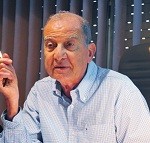After the recent scandal of the fake Olympic uniform given to the Egyptian Olympic delegation, many writers have expressed their fears that corruption might reinstate itself in a post-revolutionary Egypt. Some columnists have shared the same concern while considering the actions of owners of satellite TV channels who strive to please President Mohamed Morsy and his Muslim Brotherhood group in lieu of preserving the independence of Egyptian media. Opinion pages across many Egyptian newspapers have also continued their analysis of the appointment of Hesham Qandil and the Muslim Brotherhood’s way in which the Muslim Brotherhood’s future in Egyptian politics rests upon their success in the current government.
Owners of Satellite TV stations grovel to the presidential palace Emad Al-Din Hussein  Al-Shorouk newspaper
Al-Shorouk newspaper
In his column, Emad Al-Din Hussein denounces owners of some Egyptian satellite channels for striving to please the new rising power of the Muslim Brotherhood and refrain from any attacks against President Mohamed Morsy. He cites the example of a channel owner who was known for backing the idea of having Gamal Mubarak as president, and has now shifted to a rebellion over the former regime, displaying obvious support to the Islamists. Hussein argues that this approach might be imitated by other owners of non-state TV stations and might extend to influence the majority of businessmen who were once loyal to Mubarak and his gang. It is always legitimate for businessmen to cater to their own interests, but Hussein refutes the seeming competition taking place between the channels’ owners to acquire the authorities’ good graces.
The writer sounds fearful of the spread of an attitude of hypocrisy that can easily drag Egypt back to a similar era of Mubarak’s corruption. If business tycoons and media professionals, who are always supposed to remain neutral and independent, look to appease the Muslim Brotherhood, the glamour of 25 January revolution will possibly fade away. Hussein calls upon all active forces in society to unveil any deplorable relations between satellite TV channels and the authorities so as not to reiterate the darkness of the old regime.
T-Shirts, shorts, tenders and quotations Ziad Bahaa Al-Din Al-Shorouk newspaper
 As millions have been sitting on the edge of their seats watching the opening ceremony at the London’s Olympics, the Egyptian delegation was busy with the fake Olympic uniforms provided by the Egyptian Olympic Committee. Ziad Bahaa Al-Din criticises the scandal of the fake apparel and the recent statements produced by the official responsible for the Olympic bag claiming that they had to pick the cheapest offer to abide by the Egyptian tenders and quotations law. The official has further confirmed that the idea behind choosing the non-original Olympic supplies does not involve corruption or immoral behaviour conducted by the Olympic Committee. Refuting the statement, Bahaa Al-Din argues that the same law the official is referring to also stresses on the importance of complying with the proper quality standards and copyrights. Both conditions were overlooked in this case.
As millions have been sitting on the edge of their seats watching the opening ceremony at the London’s Olympics, the Egyptian delegation was busy with the fake Olympic uniforms provided by the Egyptian Olympic Committee. Ziad Bahaa Al-Din criticises the scandal of the fake apparel and the recent statements produced by the official responsible for the Olympic bag claiming that they had to pick the cheapest offer to abide by the Egyptian tenders and quotations law. The official has further confirmed that the idea behind choosing the non-original Olympic supplies does not involve corruption or immoral behaviour conducted by the Olympic Committee. Refuting the statement, Bahaa Al-Din argues that the same law the official is referring to also stresses on the importance of complying with the proper quality standards and copyrights. Both conditions were overlooked in this case.
The issue is not as simple as it seems in Bahaa Al-Din’s estimation. It, on the contrary, reflects a growing culture of corruption affecting the bureaucracy and governmental employees. The writer affirms that blindly following rules without understanding the essence of the law will not curtail corruption, theft or protection of public money. Egypt is in dire need of revisiting the wording of the laws and reassessing methods of combating corruption, while bearing in mind the possibilities of official errors that can normally stem out of governmental employees, who are, after all, normal human beings.
The Muslim Brotherhood’s government Ibrahim Mansour Al-Tahrir newspaper
Recalling the times when the National Democratic Party (NDP) was relaxing on the peak of Egypt’s political pyramid, Ibrahim Mansour affirms that the ruling Muslim Brotherhood is little different to the old regime. In his column, Mansour compared the Freedom and Justice Party (FJP) and the NDP, stating that the Muslim Brotherhood is following in the footsteps of the former party to monopolise power and seize authority. Gamal Mubarak used to head the political committee of the dissolved NDP, a scene similar to the Muslim Brotherhood’s attempt to formulate a purely FJP government.
It is the Muslim Brotherhood’s right to strive to reach power, in Mansour’s estimation. However, the lack of transparency with which ministers are being chosen and talks are being held, hauls Egypt back to a stage almost identical to Mubarak’s rule. It would be more respectful for the rising Muslim Brotherhood to bravely declare their attempts to formulate a homogenous cabinet, since President Morsy has picked Hesham Qandil as the new prime minister. Since the Muslim Brothers have decided to look up to the old regime and follow its route in securing hidden deals, Mansour calls upon them to at least hold the full responsibility for any probable consequences.
The Shia Communist Mahmoud Khalil Al-Watan newspaper
 Although several media reports frequently announce the arrest of Shia groups in Egypt who attempt to spread their beliefs in the country’s Sunni community, Mahmoud Khalil argues that a lot of Egyptians practice the Shia conventions while missing that their country complies by the Islamic Sunna. Citing examples, the writer states that customs and traditions of Ramadan are the clearest example of Egypt’s Shia Fatmite era, starting with the colourful lanterns to the famous Konafa and Qatayef desserts.
Although several media reports frequently announce the arrest of Shia groups in Egypt who attempt to spread their beliefs in the country’s Sunni community, Mahmoud Khalil argues that a lot of Egyptians practice the Shia conventions while missing that their country complies by the Islamic Sunna. Citing examples, the writer states that customs and traditions of Ramadan are the clearest example of Egypt’s Shia Fatmite era, starting with the colourful lanterns to the famous Konafa and Qatayef desserts.
Khalil emphasises that Egyptians generally prefer to stick to their beloved traditions, regardless of their Shia origins, while not giving the same attention to safeguarding their Sunni belief. He argues that ordinary Egyptians might not know what kind of difference separates a Shia from a Communist person. Egyptians still celebrate the Shia Ashoura without knowing the background history of the event and Egyptian families who cook the sweet Ashoura dessert are not aware that they are celebrating the killing of Al-Hussein, Prophet Mohammed’s grandson, and his defeat in front of Yazeed Bin Moaweya in Iraq’s Karbala.
The Muslim Brotherhood way in heading the cabinet Mohamed Aboul Ghar  Al-Masry Al-Youm newspaper
Al-Masry Al-Youm newspaper
There are many questions related to President Morsy’s choice to appoint Hesham Qandil as Egypt’s new premier. In his column, Mohamed Aboul Ghar regards the current political situation as a pure imitation of Mubarak’s times. He argues that the only difference is that the Muslim Brotherhood and Mubarak’s old dictatorship have swapped. The writer asks if Qandil’s selection stems from Morsy’s genuine desire to see the man head his government, or rather has its roots in the decisions made in an executive meeting if the Muslim Brother’s that preceded the decision by 48 hours only. He wonders if Qandil has managed to assume the post thanks to the quality of obedience he exhibited during his position as the bureau manager for the former Minister of Irrigation.
The other question posed is how much does Egypt require an experienced politician to assume the tough job of prime minister? Does the country merely need a technocratic personality that delegates powers? Aboul Ghar believes that a prime minister should be of a strong personality capable of delivering Egypt out of these dark times. Will the Muslim Brotherhood allow the new prime minister to take difficult decisions, or will the cabinet have to present detailed proposals to the president, who in turn will defer to the figureheads of the Muslim Brotherhood? Finally, Aboul Ghar estimates that in a Qandil cabinet everything will have to go through a Mory filter.



